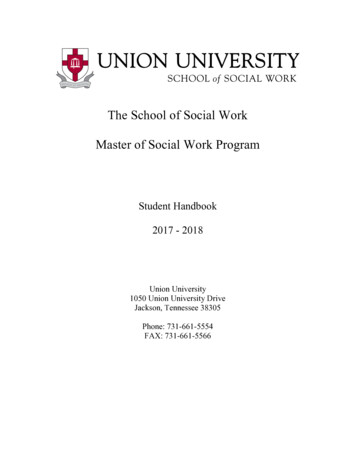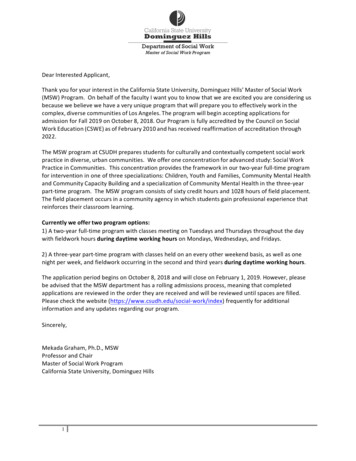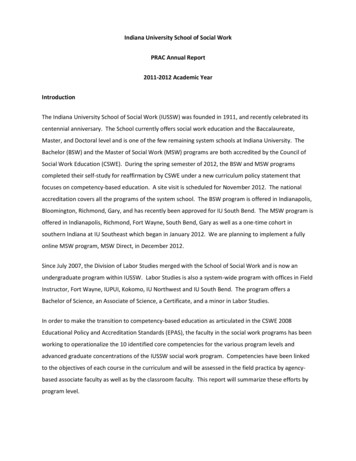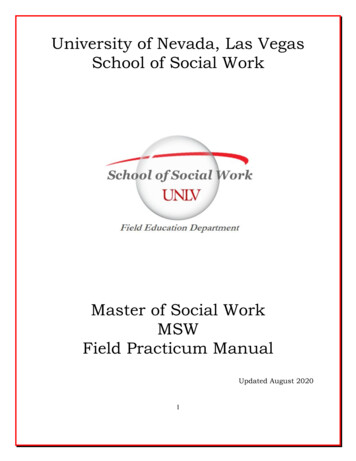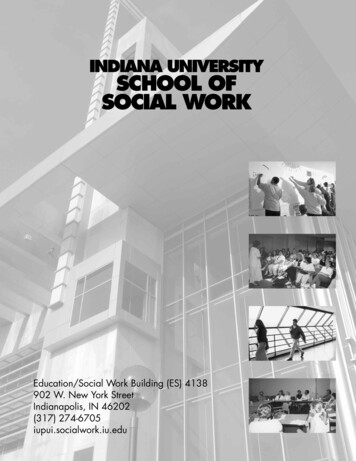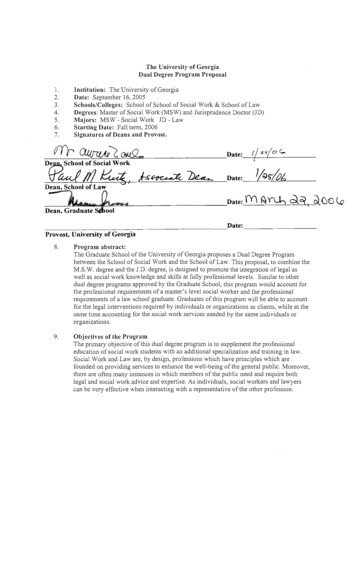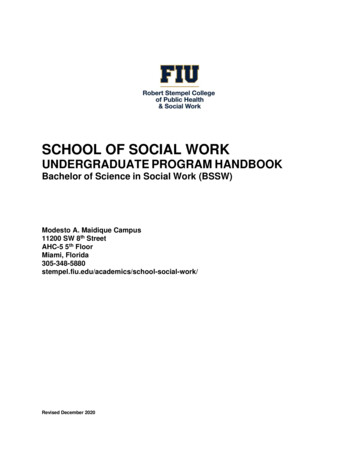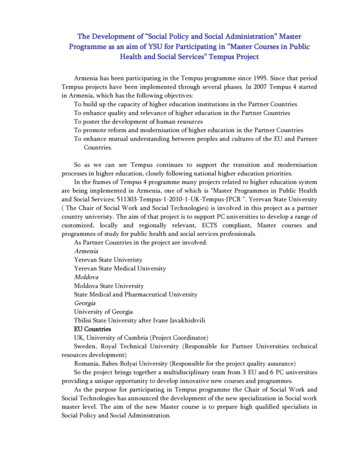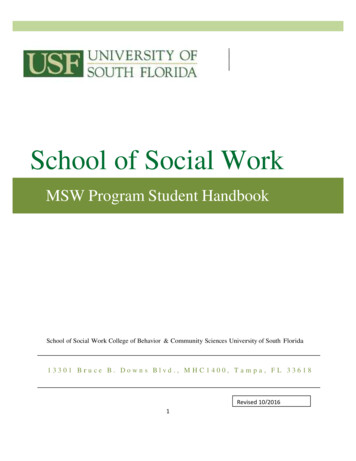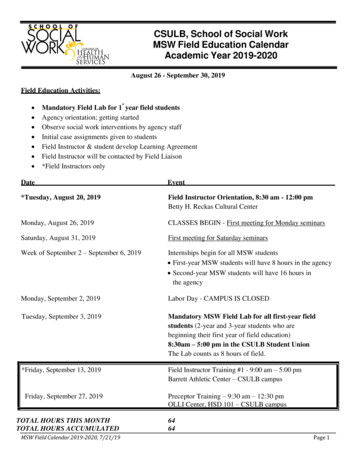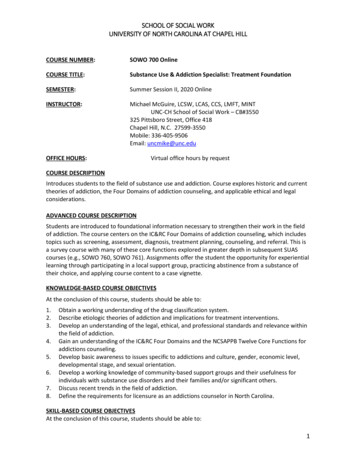
Transcription
SCHOOL OF SOCIAL WORKUNIVERSITY OF NORTH CAROLINA AT CHAPEL HILLCOURSE NUMBER:SOWO 700 OnlineCOURSE TITLE:Substance Use & Addiction Specialist: Treatment FoundationSEMESTER:Summer Session II, 2020 OnlineINSTRUCTOR:Michael McGuire, LCSW, LCAS, CCS, LMFT, MINTUNC-CH School of Social Work – CB#3550325 Pittsboro Street, Office 418Chapel Hill, N.C. 27599-3550Mobile: 336-405-9506Email: uncmike@unc.eduOFFICE HOURS:Virtual office hours by requestCOURSE DESCRIPTIONIntroduces students to the field of substance use and addiction. Course explores historic and currenttheories of addiction, the Four Domains of addiction counseling, and applicable ethical and legalconsiderations.ADVANCED COURSE DESCRIPTIONStudents are introduced to foundational information necessary to strengthen their work in the fieldof addiction. The course centers on the IC&RC Four Domains of addiction counseling, which includestopics such as screening, assessment, diagnosis, treatment planning, counseling, and referral. This isa survey course with many of these core functions explored in greater depth in subsequent SUAScourses (e.g., SOWO 760, SOWO 761). Assignments offer the student the opportunity for experientiallearning through participating in a local support group, practicing abstinence from a substance oftheir choice, and applying course content to a case vignette.KNOWLEDGE-BASED COURSE OBJECTIVESAt the conclusion of this course, students should be able to:1.2.3.4.5.6.7.8.Obtain a working understanding of the drug classification system.Describe etiologic theories of addiction and implications for treatment interventions.Develop an understanding of the legal, ethical, and professional standards and relevance withinthe field of addiction.Gain an understanding of the IC&RC Four Domains and the NCSAPPB Twelve Core Functions foraddictions counseling.Develop basic awareness to issues specific to addictions and culture, gender, economic level,developmental stage, and sexual orientation.Develop a working knowledge of community-based support groups and their usefulness forindividuals with substance use disorders and their families and/or significant others.Discuss recent trends in the field of addiction.Define the requirements for licensure as an addictions counselor in North Carolina.SKILL-BASED COURSE OBJECTIVESAt the conclusion of this course, students should be able to:1
SCHOOL OF SOCIAL WORKUNIVERSITY OF NORTH CAROLINA AT CHAPEL HILL1.2.3.4.Use a less stigmatizing language of addiction and recovery.Demonstrate beginning proficiency in the integration of the Four Domains.Identify signs and symptoms relative to substance use, intoxication, and withdrawal.Demonstrate ability to assist individuals and/or families in determining the appropriate level ofintervention based on their available needs and resources.5. Develop self-awareness of one’s paradigms surrounding addiction and treatment.REQUIRED COURSE TEXTBOOKS1. IC&RC Alcohol and Drug Counselor (ADC) Certification Examination Study Guide (2016), 3rdedition. Comprehensive Education Services (a wholly owned subsidiary of The FloridaCertification Board).2. Center for Substance Abuse Treatment. Addiction Counseling Competencies: The Knowledge,Skills, and Attitudes of Professional Practice. Technical Assistance Publication (TAP) Series 21.DHHS Publication No. (SMA) 08-4171. Rockville, MD: Substance Abuse and Mental HealthServices Administration, 2008. Available for free download: ounseling-Competencies/SMA15-4171SUGGESTED READING/RESOURCES1. NAADAC Code of Ethics c-code-of-ethics-033117.pdf2. North Carolina Substance Abuse Professional Practice Board (see Rules and Credentialing) https://www.ncsappb.org/3. Title 42, SUBCHAPTER A, PART 2—CONFIDENTIALITY OF ALCOHOL AND DRUG ABUSE PATIENTRECORDS: 1/pdf/CFR-1997-title42-vol1part2.pdf4. SAMHSA TIP 27: Comprehensive Case Management for Substance Abuse Treatment MA15-42155. Diagnostic and Statistical Manual of Mental Disorders, 5th Edition. http://dsm.psychiatryonline.org/book.aspx?bookid 5566. The ASAM Criteria for Substance Abuse, American Society for Addiction Medicine, 3rd Edition http://www.asam.org/7. Publication Manual of the American Psychological Association, Sixth EditionINSTRUCTIONAL METHODOLOGYAlthough the course material is presented online, there are benchmarks requiring you to engage incoursework throughout the week using Sakai. There is a host of teaching modalities includingreadings, field assignments, reflective writing, peer review, guest videocasts, and instructor videos.This mix of teaching methodologies will ensure students’ cognitive, affective, and experientialengagement.In spite of this being an online class, I hope to develop an engaging environment that reflects thevalues of the social work profession. A supportive learning environment is fostered by listening to theideas and views of others, being able to understand and appreciate a point of view different from ourown, clearly articulating our point of view, and linking experience to readings and assignments. I willappreciate your contributions to making this an enjoyable and respectful class for learning and2
SCHOOL OF SOCIAL WORKUNIVERSITY OF NORTH CAROLINA AT CHAPEL HILLgrowth.Please keep in mind, this five-week course condenses a full semester of learning objectives. With thatin mind, you can expect to spend 3-4 hours each day on reading and other assignments. If you fallbehind in your work, you may find it quite difficult to recover due to the short timeframe. I urge youto start fast and finish strong. Here is a link to Sakai Student Tutorials:https://sakaitutorials.unc.edu/?How to .%7C%7CStudents Here is a video explaining how to upload assignments to Sakai under the Assignments Tab:https://www.youtube.com/watch?v bAAHf8PUApQ Note: If, after due diligence, you are unable to upload an assignment onto Sakai, please emailme the assignment: uncmike@unc.eduASSIGNMENTSASSIGNMENT #1 A&B&C – COURSE ENGAGEMENT (INCUBATOR TEAM SESSIONS CASE APPLICATIONWORKSHEET LESSON CONTENT):ASSIGNMENT #1-A – INCUBATOR TEAM: DUE DATES VARY PER “CLASS SCHEDULE” BELOWEach week you will meet via Zoom with your Incubator Team members, and each week someonenew will act as facilitator. Agenda to cover:1.2.3.4.Quick check-in (e.g., “On a scale from 1-10, where are you and why that number?”)Abstinence check-in (e.g., “So, how much does this suck?”)Meetings check-in (e.g., “Anyone go to a meeting yet? What was it like?”)Lesson Task – Engage in robust conversation about the assigned material (noted on thatweek’s lesson plan). Come prepared and practice critical thinking skills.5. Team Report – Facilitator gathers consensus for the three prompts below (not the stuff listedabove), records them in an email, and sends them to the instructor. Please copy yourteammates so I can “reply all”.a. What did we do well?b. What can we do better next time?c. What grade do we give our team for this session (0-100)?ASSIGNMENT #1-B - CASE APPLICATION WORKSHEET: DUE DATES VARY PER “CLASS SCHEDULE” BELOWThe goal of this assignment is to apply your understanding of content covered in each lesson to acase scenario. For example, after learning about screening clients for problematic substance use youwill apply your knowledge to a case vignette. You will complete a worksheet and submit it throughSakai for a peer to review. In turn, you will review and offer feedback of a worksheet submitted byone of your peers.Instructions:1. Carefully watch the following video of an ?v YqsGS6kvVrY&t 16s2. Using the Case Application Worksheet apply what you have learned from each of the weeklylessons. The worksheet can be found in Sakai within Assignment #1-B – Case Application3
SCHOOL OF SOCIAL WORKUNIVERSITY OF NORTH CAROLINA AT CHAPEL HILLWorksheet Lessons 1 & 2 under the Assignment Tab.3. Upload your completed worksheet to the corresponding assignment on Sakai to allow a peerto review your work and offer feedback.4. In the meantime, you will review one of your peer’s completed worksheets and offerfeedback and a grade through the Sakai peer assessment system. The distribution process iscompleted automatically by Sakai.5. This process in repeated for lessons 3 & 4.6. Lesson 5 has two minor variations: 1) this lesson, which will include the other lessons youalready completed, is submitted to the instructor for review instead of to your peers forreview, and 2) be sure to complete the self-evaluation found at the bottom of the document.7. Be sure to follow the timeline for completion found under the section “Class Schedule withAssignments” below and on the worksheet.8. Due to the compressed timeline of the course, it is imperative you submit work on time. Forthis assignment, late completion of work cannot be accepted, and failure to either submit orreview worksheets will result in a zero for that portion of the assignment. Plus, it leaves oneof your classmates hanging.You earn your grade through the quality of your submissions as determined by both your peers andyour self-evaluation. Additionally, consider the quality of feedback you offered your peers as part ofyour self-evaluation grade for this assignment.ASSIGNMENT #1-C – LESSON CONTENTAs part of our self-evaluation, you will be asked to assess how thoroughly you reviewed the lessonmaterial, including articles, websites, videos, and e-games.ASSIGNMENT #2 - ABSTINENCE PROJECT PAPER: SEE DUE DATES IN “CLASS SCHEDULE” BELOWYou will abstain from a mood-altering chemical, substance, or food during much of this course.Substances may include alcohol, nicotine, caffeine, sugar, chocolate, or similar substances. Choose asubstance that will be a clear challenge to stop using. The learning in this project comes fromabstaining, thus it is important to make your very best effort in this regard. Other behaviors may beconsidered as well (e.g., cell phone, social media, etc.).Please note, you must submit a draft of Sections 2 and 3 of this paper, as noted below, prior to theinitiation of abstinence.Students in recovery should use caution in choosing their choice of substance or behavior from whichto abstain. Please be confident your choice will not jeopardize your recovery. If you would like todiscuss this issue feel free to contact me.You earn your grade by demonstrating critical thinking skills, personal insight, and an understandingof how the project relates to Problematic Substance Use and Substance Use Disorders.ABSTINENCE PAPER ORGANIZATION (FOLLOW THE RUBRIC, LOCATED IN SAKAI UNDER THE SYLLABUS TAB OR RESOURCETAB). BASIC STRUCTURE:1. Introduction (Section 1)2. Goodbye Letter to substance/behavior (Section 2) – Write a letter to your substance of choiceremarking upon the pros and cons of your relationship. Say farewell to the substance, at leasttemporarily. Feel free to be creative in your approach to this letter.3. Abstinence Expectancies (Section 3)- Discuss what you expect from the project. Include: The substance you chose to abstain from and why4
SCHOOL OF SOCIAL WORKUNIVERSITY OF NORTH CAROLINA AT CHAPEL HILL Identified supports (minimum of two) and your expectations of themYour motivation for change (or lack thereof)An exploration of potential challenges during the projectYour expectations about the project, specifically, whether you will succeed or fail, and bywhat definition4. Reflections of the Process (Section 4) -Reflect on your experience over the past several weeks.This should be an account of your struggles, successes, insights, setbacks, perceptions, etc. Thissection should incorporate course materials as they relate to this project; this is NOT just areflection of the process. You would do well to consider this from a bio-psycho-social-spiritualperspective.5. The Educational Experience (Section 5) - Summarize your experience and what you learned. Ifnot yet covered in the section above, this section of the project should answer the followingquestions: What did you learn about yourself?What did you learn about behavior and attitude change?How did your motivation change during the project (according to the stages of change)?Can change occur without intrinsic desire?What did you learn about relapse and relapse prevention?How has this project impacted your view of addiction? People with SUD’s? Treatment?Probably a good section to incorporate the minimum of two scholarly articles.PAPER FORMAT Maximum of seven pages, typed (not including the reference page), double-spaced, 1-inchmargins.Use APA style and format (although use of first-person is acceptable when it seemsappropriate)Reference pageA minimum of two scholarly resources, outside of the course material, are required. Theseresources should support the theme(s) of your paper and not appear as being forced intoyour paper as an afterthought.Paper will be graded on fulfillment of assignment, clarity of ideas, use of resources, correctformat, and grammar.*A grading rubric is available in Sakai under the Syllabus Tab and must be completed and submittedalong with your paper.ASSIGNMENT #3 – SUPPORT GROUP REACTION PAPER: SEE DUE DATES IN “CLASS SCHEDULE” BELOWThe description below does not consider changes in our communities stemming from the COVIDpandemic. Mutual support groups, such as AA, NA, and SMART Recovery have moved to an onlinevenue. Although online meetings are more accessible, finding one that is “open” (meaning to anyone,including guests who are not seeking recovery) may be more of a challenge. For AA, you may want totry: https://aa-intergroup.org/.You must attend one (1) support meeting in the community. You may select from AlcoholicsAnonymous, Al-Anon, Narcotics Anonymous, Overeaters Anonymous, Codependents Anonymous oranother recovery and/or mutual aid group. You need to attend a meeting in a community-basedsetting (i.e., not within treatment centers, hospitals, or mental health centers). Unless you identify asa recovering person you must go to a meeting designated as “open”. Open meetings are designed5
SCHOOL OF SOCIAL WORKUNIVERSITY OF NORTH CAROLINA AT CHAPEL HILLfor anyone interested in twelve-step programs. Should someone ask, be honest about your reasonfor attending “I am here because I want to learn more about twelve-step meetings”, or, “Myname is [Mike} and I am happy to be here.” On a participant/observer continuum, your role leansheavily towards observer. You may want to research the type of meeting you plan to attend as wellas the philosophy of the program before you go. To be a good observer you need to know somethingabout what you are observing, but please do not take notes during the meeting. Above all, respectthe anonymity of the people you meet during this experience. Keep in mind you may meet peoplethat you know but were unaware of their participation in a recovery group. If you have a rich historyin attending this type of meeting, try something new. It is normal to feel a bit invasive. However,overwhelmingly students report members as welcoming and happy to have another person becomeknowledgeable about the meeting or organization.REACTION PAPER ORGANIZATION (FOLLOW THE RUBRIC, LOCATED IN SAKAI UNDER THE SYLLABUS TAB OR RESOURCETAB). BASIC STRUCTURE:1. Introduction2. Review of MeetingsProvide a brief review of the meeting. Consider format, structure, demographics, andatmosphere of the meeting.3. Personal ReactionDescribe what the experience was like for you. Questions to consider may include: Howmight your experience influence your work with clients in active addition and/or recovery?How did your personal constructs about problem substance use and recovery change as aresult of this project? What was the most important thing you learned from this experience?What questions, concerns, and reassurances did this project bring to mind?4. CourseworkHow does your experience relate to your coursework? This section demonstrates ability toapply learning.5. ConclusionPAPER FORMAT Maximum of five pages, (not including a reference page, if applicable), typed, double-spaced,1-inch marginsAPA style and format is not requiredUse first person perspectiveReference page (if applicable)Maintain anonymity of individuals you encountered in the meetingYour paper is graded on fulfillment of assignment, clarity and integration of ideas, and correct formatand grammar.* A grading rubric is available in Sakai under the Syllabus Tab and must be completed and submittedalong with your paper.FINAL EXAM:DUE JULY 28 BY 11:30 P.M. (ONLINE)The final exam will be online through Sakai and available July 28 from 5:00 a.m. to 11:30 p.m. Ninetyminutes are allotted to complete the exam. You must complete the exam by 11:30 pm and you willbe locked-out after 90 minutes. It is therefore critical to monitor your time. The format of the exam6
SCHOOL OF SOCIAL WORKUNIVERSITY OF NORTH CAROLINA AT CHAPEL HILLwill include multiple choice, true/false, and fill-in-the-blank. As tempting as it may be, this is NOT anopen-book exam. A study guide will be made available about a week prior to the exam. Whilehelpful, this does not cover all the material on the exam.POLICY ON INCOMPLETE AND LATE ASSIGNMENTS:Any deviation from announced deadlines for written assignments or examinations must be cleared inadvance with the Instructor. As a rule, late papers will not be accepted. Make-up exams must betaken within three days of the announced date and will require documentation of illness or familycrisis.POLICY ON MISSED CLASSES:You are expected to complete all assignments within the completion dates of the assignments.POLICY ON ACCOMMODATIONS FOR STUDENTS WITH DISABILITIES:Accessibility and Resources ServicesThe University of North Carolina – Chapel Hill facilitates the implementation of reasonableaccommodations, including resources and services, for students with disabilities, chronic medicalconditions, a temporary disability or pregnancy complications resulting in difficulties with accessinglearning opportunities. All accommodations are coordinated through the Accessibility Resources andService Office. In the first instance please visit their website http://accessibility.unc.edu, Tel:- 919962-8300 or Email: accessibility@unc.edu. A student is welcome to initiate the registration processat any time; however, the process can take time. ARS is particularly busy in the run-up to Finals andduring Finals. Students submitting Self-ID forms at that time are unlikely to have accommodations setuntil the following semester. Please contact ARS as early in the semester as possible.WRITING EXPECTATIONS AND SUPPORTThe School of Social Work faculty has adopted APA style as the preferred format for papers andpublications. All written assignments for this course should be submitted in APA style unlessotherwise indicated by the nature of the assignment.Clear, cogent writing is an essential skill for social work professionals. Writing support is available toall students through the School’s Writing Support Team; they can help you strengthen your writingskills by sharing strategies for organizing information, presenting a cohesive argument, ensuring clearcommunication, and mastering APA style. Writing Support offers a learning opportunity for studentsbut does not merely copy edit student papers. Writing support is available in-person, by e-mail, or byphone. E-mail a requested appointment day and time to SOSWwritingsupport@gmail.com . Inaddition, see the Writing Resources and References page on the School’s website (under the CurrentStudents Tab: https://ssw.unc.edu/students/writing ).ACADEMIC DISHONESTY:Plagiarism in any form is not acceptable and it is a violation of the UNC Honor Code. Plagiarism isdefined by the Honor code as the "the deliberate or re
UNC-CH School of Social Work – CB#3550 325 Pittsboro Street, Office 418 Chapel Hill, N.C. 27599-3550 . Course explores historic and current theories of addiction, the Four Domains of addiction counseling, and applicable ethical and legal considerations. . U
